Keyword Research: The Ultimate Guide For 2022 


If you want to get more organic search traffic to your website, SEO can deliver.
With a strong SEO strategy and the right keywords, you’ll climb to the top 10 in Google rankings and increase your revenue.
But with TRILLIONS of searches every year, how do you choose the right keywords to target? That’s why you’re here. And that’s the very question we’re going to answer.
In this guide, we’ll take you through all the essential steps to conduct keyword research. We’ll break down exactly what keywords are, and the importance of the right keyword research process for your website. Then we’ll take you through seven easy steps so you can do it yourself. Finally, we wrap it up with a handy checklist and a list of the best SEO tools out there:
2. Why is keyword research important?
3. Elements of keyword research
4. How to do keyword research in 7 steps
Ready to skyrocket your revenue from search engines?
Let’s go.
What are keywords?
Keywords are the words, phrases and sentences (“search queries” or “search terms”) that people type into a search engine when they want to find information.
When a user types a search query into a search engine like Google or Bing, the search engine uses an algorithm to scour the web to identify the most relevant websites to pull up in the search engine results page.
While there are a ton of different factors that search engines take into account when finding results, one of the key ways they figure out the relevance of a website is by matching up a searcher’s keywords with the content on a website.
If the keyword search is the same, or similar, the website has a higher chance of appearing at the top of search results (SERP).
There are a few different types of keywords:
- Short-tail keyword. These are broad keywords. It could be a single word or phrase that is very generalised, such as “car for sale”. Short-tail keywords are typically 3 words or less with a higher search volume.
- Long-tail keyword. Long-tail keywords are a combination of several terms with lower search volume. When someone types more detail into a search engine, this is a long-term keyword. An example of this would be “cheap cars for sale in Sydney” or “what are the best second-hand cars for sale?” More than 70% of all searches are for long-tail keywords.
- Primary keyword. The primary keyword is the main keyword phrase that you’re targeting in your content strategy. It’s the one that you’re aiming to rank for and should feature in the headline, domain, blog post, meta description, and meta title for that piece of content.
- Secondary keyword. These are extra SEO keyword phrases you’re hoping to rank for with your content. These can be either short-tail or long-tail keywords that build up the semantics of the overall topic.
What is keyword research?
It’s the process of identifying the different search queries that people are looking for.
Using the information gathered from your list of keywords, you can optimize the content on your website to target the best keywords and rank higher in the top 10.
There are trillions of searches on Google every year. Out of these, there are thousands — maybe even tens of thousands of search terms that are relevant to your business. Of course, you can’t target them all.
To really make an impact with your SEO, you have to pick and choose the search terms you want to focus on.
Keyword research helps you do this using the power of data. By honing in on ones that have a good monthly search volume, low competition, or that convert well, you can prioritize your SEO efforts.
Why is keyword research important?
Keyword research is important because it’s the foundational aspect of any SEO strategy. It guides every other aspect of your SEO, from which keywords to focus on to on-page optimisation and content planning. When you nail your keyword research, the rest of your SEO strategy falls into place — and you’ll improve your business’s visibility in Google’s search results.
But let’s back up for a second. Why increase visibility on Google?
To answer that, let’s take a look at this graph that illustrates the clickthrough for Google search results. When looking at it, keep in mind that every page on Google’s search results has 10 results:
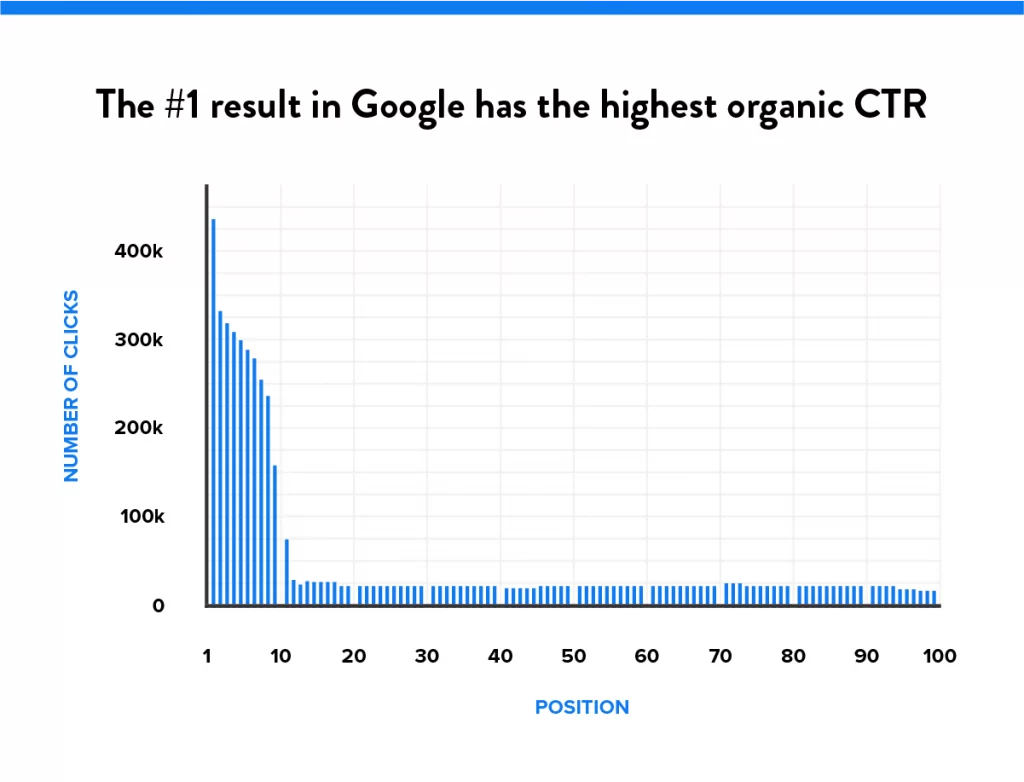
Notice the sharp dropoff in the number of clicks after position 10? That’s because the majority of searchers never make it past the top three results on Google — let alone past the first page.
In fact, more than 75% of ALL clicks go to the top three results. On top of that, only 0.78% of Google searchers click on someone on Page 2. The numbers just keep dropping from there.
If you want to get traffic through search engines, you NEED to be on that first page. More importantly, you need to be in those top three results. Finding and targeting relevant keywords in your SEO strategy helps you do just that.
That’s why improving organic search presence on Google is the #1 priority for 61% of marketers around the world. The simple truth is that SEO is the most profitable marketing tool in your arsenal. When you rank at the top of search results, your site has more visibility. More visibility means more search traffic. And more traffic ultimately translates to greater revenue.
Keyword research isn’t just for content marketing and B2B businesses either. If you’re running an eCommerce business, eCommerce SEO keyword research is an absolute non-negotiable for your business.
Think about it: your entire business is based on customers shopping online. And when it comes to online shopping, roughly 1 in 2 shoppers use Google to discover new brands. If you don’t appear at the top of the first page for relevant search terms, you’ll literally lose out on ready-to-buy customers who are looking to purchase the exact products in your store.
Bottom line: keyword research is important for any business looking to improve SEO and increase online visibility. Now let’s move on to the next part: understanding the elements you need to consider when conducting keyword research.
The Elements of Keyword Research
When you’re conducting SEO keyword research, there are three elements that you need to pay close attention to: relevance, authority, and search volume. Each of these elements plays a crucial role in your ability to rank for a keyword and the overall success of your SEO game plan.
Relevance
Let’s start with relevance. At the heart of it all, Google wants to show users the most relevant content for their search.
According to How Search Works:
Google ranking systems are designed to do just that: sort through hundreds of billions of webpages in our Search index to find the most relevant, useful results in a fraction of a second, and present them in a way that helps you find what you’re looking for.
In other words, you’ll have a better chance of ranking for your target keywords if you provide content that’s relevant to your searcher’s needs.
For example, if someone is looking up “best shelter to adopt dogs” and you incorporate that keyword on a list of cats up for adoption, your web page isn’t really answering that searcher’s question. As a result, that page will be less likely to appear on top for searches related to dog adoption — even though you’ve incorporated the keyword on the page.
When you’re building your keyword strategy, try to focus on keywords related to your brand, product or service. These will give you the best shot of solving your target market’s problem and, consequently, ranking higher for that keyword in search results.
Authority
On top of relevance, Google also prioritizes content from authoritative sources. This means content from a well-established expert or influential publication will appear higher in search results than the same piece of content from a nondescript website with unknown authors.
Google has a few factors it considers to measure authority, but the top ones are a website’s expertise, authoritativeness and trustworthiness (also known as E-A-T). When you’re conducting SEO keyword research, you need to consider your site authority when deciding which search terms to target. At the same time, you should be bolstering up your website’s authority by building up backlinks from high-quality, trusted publications.
Search volume
Search volume is another consideration that you need to take into account when conducting keyword research. This is measured in monthly searches, which is calculated based on the number of times a specific keyword is searched for in Google every month.
Why does this matter?
See, it’s no use ranking on first page for a keyword phrase that nobody is searching for, much like it’s no use setting up a storefront in an area with no foot traffic. Sure, you’ll probably rank on page 1 fairly quickly — but you also won’t get any visitors to your website because nobody is searching for that term.
In an ideal world, you should be targeting high volume keywords with low competition and low ranking difficulty. You can find these using keyword research tools and testing (more on that later).
Your 7 step guide to do keyword research
#1. Create buyer personas
Before jumping into the research process, the first step is to understand exactly WHO your audience is, what matters to them, and what they’re searching for.
The ability to understand your target market is crucial to getting the right related search terms. It also helps you optimize your content for user intent.
This is where buyer personas come in. Buyer personas are ‘characters’ that embody your target customer. They help you look at your potential customers as people, rather than through the lens of sales. Once you do this, it’s much easier to understand how they’re searching on Google.
The more you know about your potential customer, the better you can pinpoint the keywords they’re using to find content. This information is also invaluable for other digital marketing platforms as well, such as social media ads or social media marketing.
So what do you need to know to build out your buyer personas?
Start with the following:
- Gender
- Age
- Average income
- Interests
- Their key problems or pain points that you can solve
- What they want to accomplish
- How your product can help them
Keep in mind that, when creating your buyer persona, you’re not limited to just one person. Most businesses have more than one buyer persona. Craft a different number of personas, based on all the different types of customers you’re hoping to reach.
Once you’ve got your buyer personas sorted, write these down and share them with your marketing team or SEO agency. Then you can move on to the next step: identifying the keywords they’re using to search.
#2. Identify topics that are relevant to your business
There are an infinite number of keywords out there on every topic and niche. When you’re in the early stages of keyword research, it can be overwhelming to figure out which ones to focus on to get the best bang for buck.
That’s why the first step of keyword discovery is to start by brainstorming broad topics that are related to your business. This could be as simple as looking at the main focus of your website or social media marketing and noting down the most common keywords, or listing out the services you provide to your customers.
For example, if you’re a home reno company in Melbourne, you could have the following topics:
- Bathroom renovations
- Kitchen renovations
- Living room renovations
- Bedroom renovations
- Home extensions
- Second storey additions
Meanwhile, if you’re a fitness eCommerce retailer, you might write down these topics:
- Activewear
- Athleisure
- Training shoes
- Gym accessories
- Supplements
Record these in a spreadsheet tool, and try to limit your list to high-level topics. Once you’ve got these done, you can move on to the next part: finding the keywords that your customers are searching for.
#3. Find niche keywords
When most people start to research keywords, they use a keyword suggestion tool. They pick the keywords that are the most popular, thinking it will give them the traffic they need.
In short, they see a ton of different keywords and build their content around them, hoping that will work. In most cases, it doesn’t. Why? Because when you try to target everything, you end up targeting nothing.
While it’s a good idea to include keywords with the highest search volume and relevant or popular keywords, these shouldn’t form the bulk of your keyword research. Instead, focus on finding niche keywords that work for your business.
When it comes to SEO, ‘niche’ doesn’t mean a narrow range and a limited audience. Good niche keywords need to cover a broad topic, without being too generic and overused. That’s where the topics you brainstormed earlier can help.
Start out by looking at your topics. Step into the shoes of your buyer, using the personas you created earlier. Think about what words they would use to search. Write these down. Then, use an SEO tool to identify the search volumes for these keywords, and provide similar recommendations.
After you’ve got an initial crop of keywords, it’s time to dig even deeper.
#4. Pinpoint long-tail keywords
If you’ve never used long-tail keywords, you’re missing out on an amazing way to increase your traffic and sales conversions. It’s one of the fundamental components of white hat SEO.
Long-tail keyword phrases are an integral part of a good keyword research formula. They’re longer and more related versions of the mainstream keywords that most businesses use. And, as we touched on before, they make up roughly 70% of all searches.
These keywords are essential because they help you cover keywords at different stages of the buyer journey.
How does this pan out? For example, let’s say you’re selling furniture. A particular keyword phrase like ‘Modern furniture for sale’ targets people in the buying stage. You should aim to rank highly for it.
But for most people, the journey starts LONG before they’re typing in this keyword into Google. They’ve likely already run searches like the following:

Or this:

By targeting these keywords, you can answer a question that someone may have long before they reach the buying stage. If you rank highly for that, you establish yourself as an authority and nurture that person through the funnel and onto the next stage.
Then, when they’re ready to buy, they might type in “modern furniture for sale”. If they see your website again in organic search, chances are they’ll be more inclined to click on it. While your “modern furniture for sale” keyword helped them convert, it was actually your long-tail keyword that got them there.
So how do you find long-tail keywords? You can pop your seed keyword into a keyword research tool to help you pinpoint different long-tail ideas and their search volumes. You can include these in your target keyword list, and aim to create content to address these.
But there’s another way.
#5. Use research goldmines
If you want to rank on Google, Google is your best friend. You can use the search engine to find niche keyword phrases, but it’s also handy to pick relevant goldmines for keywords.
A good example is using forums for keyword research. Forums can be a true goldmine of information about your target audience. They can be a great tool for your advanced keyword research and can provide a ton of useful information about your audience.
Let’s use the travel industry as an example. There are a TON of forums out there related to travel and planning. You probably use them in your own travels. All you need to do is visit these forums and do a bit of research.
Just look at this example for Bali:
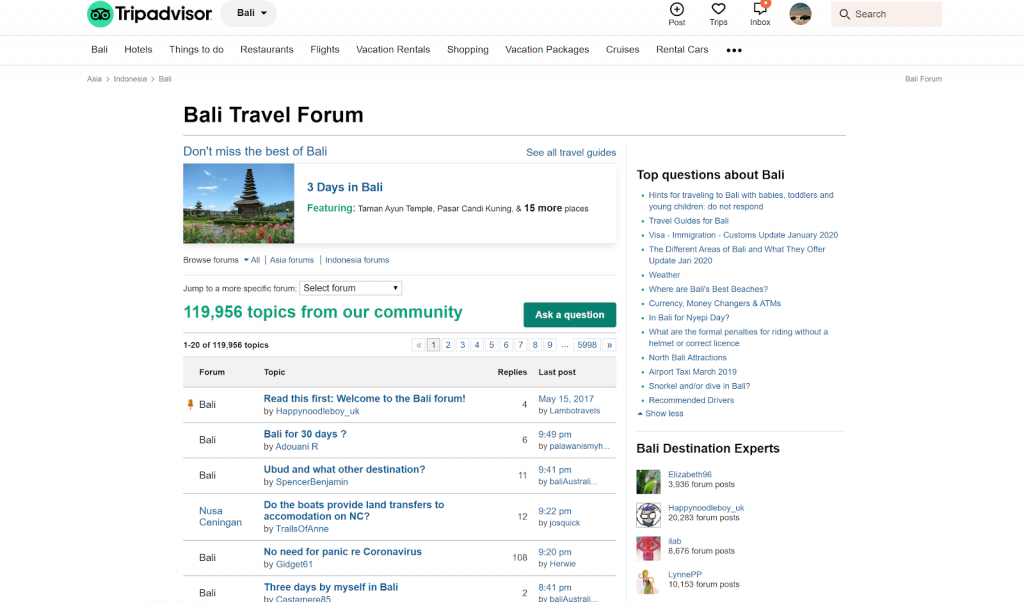
Straight away, it’s easy to see the questions people are asking. You can use that to target niches with quality content. Structure content around the questions people ask on such forums.
After you’ve done this for some time, you’ll get a rush of new niche keyword ideas.
You can rinse and repeat with platforms like Google Trends, Reddit, Quora, Whirlpool or Wikipedia. Another way to find questions people are asking is to hop onto an existing blog post that is ranking on the topic and look at the comments section. Trending social media topics can also come in handy.
#6. Choose your final list of keywords
By now, you probably have an impressive list of new keywords that you could target. But just because you can target them, it doesn’t mean you SHOULD.
Here’s why.
Some keywords may have an incredible search volume with thousands of people searching for that phrase every day. However, these keywords are also likely to be extremely competitive — which means it could take months or even years to bump up your rankings.
Conversely, other keywords might be so obscure that only one or two people search for them every year. If you invest your time targeting those, you’ll be losing out on other opportunities to target keywords that will bring more visitors to your site.
After you have all of your keyword ideas jotted down, it’s time to conduct some keyword analysis to finalise your list of target keywords. Here are some considerations to help you decide which ones you’re going to focus on:
Align on search intent
Every search has an intention behind it. When you align search intent with your website goals you’ll be able to make your keywords work harder for your business.
If you’re selling products or services on your website, target keywords with commercial intent. Look for keywords with the phrase “buy” or “shop” — anything that signals the customer is interested in making a purchase.
If your website is heavily content-focused or informational, build up your authority by targeting keywords with informational intent. These are search terms where a user is looking for an answer to a question, and often contain phrases like “what”, “how” or “why”.
Focus on the low-hanging fruit
Unfortunately, SEO takes time. Even with the best SEO strategy and keyword research, it could take 8 to 12 months before you get the results you want. That’s why it’s important to try and lock down some short-term gains while focusing on the long game.
Look at the keyword phrases that you already either have good search volume for or believe that you can rank for with minimal effort.
These could include:
- keywords with a high search volume and low competition
- keywords where the top competitors have a lower domain authority
- keywords where your website is already ranking on page 1 but you’re not in the top 5 spots
- keywords where you’re ranking on page 1 but you’re appearing below SERP features like featured snippets.
By doing this, you’ll get more traffic AND you’ll give yourself some breathing room to focus on the more challenging keywords.
#7. Test your keywords
This is the final step, but it’s an important one to ensure you’re investing your time and resources into the most profitable keywords.
Don’t just jump into optimizing your website for your target phrases. Look at your final list, and test those same keywords rigorously using Google Ads. Run a small paid search campaign using the “exact match” option. This helps you figure out how much search volume & traffic the keyword generates when given a high positioning.
Run the campaign for 24 hours. Then head in to Google Analytics (or any other website analytics software)and look at the number of conversions you get for a few hundred clicks. Let’s say your test led to 10,000 impressions and 300 clicks in 24 hours. Of those clicks, 20 people converted into customers. They generated a total of $1800 in revenue. That means one visitor is worth ~$6 in revenue.
That’s from a 3% Click-Through Rate (CTR). SEO can achieve an average of 31.75% if you obtain the top ranking. A 30% click-through rate on those 10,000 impressions means 3,000 clicks.
And that equates to $18,000 in revenue per day. That’s a worthwhile niche keyword to put in your organic search traffic bucket.
Of course, your tests may provide the opposite results. You could end up with tons of impressions and no conversions. Or, you may discover that a keyword is so niche that nobody searches for it. When you use this technique, it helps you target niches that convert while avoiding those that don’t.
Best keyword research tools
Keyword research involves just that: research. To do this, you need to have the right tools in your arsenal.
Below, we’ve listed some of the best research tools out there to help you crush the competition and win your SEO game.
1. Google Keyword Planner
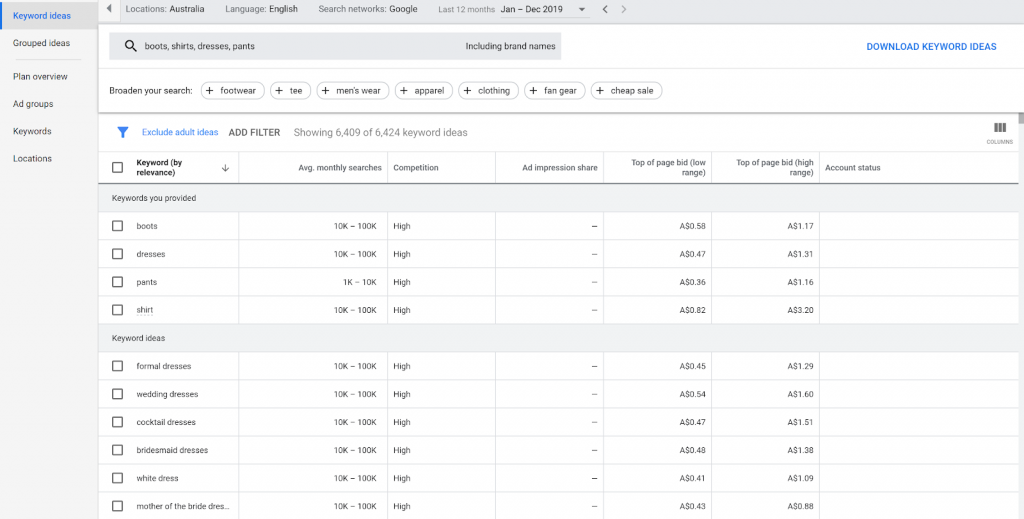
Google Keyword Planner is a reliable favorite for a reason. Keyword Planner gives you information straight from the source. The best part is it’s a free keyword tool.
Using Google Keyword Planner, you can get a quick snapshot of monthly search volume for keywords that are relevant to your business. But what makes this a great free keyword planning tool is the ability to check out the competition.
Take a look at that screenshot above. You can see the competition level for different keywords, as well as the search volume per month. With this information, it’s easier to find keywords and spot opportunities to target search terms with higher search volumes and low keyword difficulty.
2. KWFinder
Once you have your initial list of topics, KWFinder is a great keyword research tool to help you dig deeper and flesh out your list of keywords. It gives you keyword suggestions, volume of monthly searches, autocomplete queries, and actual questions that your target audience asks.
Here’s KWFinder in action for the seed keyword “PPC management”:


Here’s the list of autocomplete recommendations:
The suggestions and autocomplete sections give you some additional keyword ideas. The questions show you what people are asking, which provides plenty of blog post topic ideas and ideas for your broader content strategy.
On top of this, KWFinder has been noted by other digital marketing industry professionals as having the most accurate keyword difficulty rankings out there. This way, you can evaluate exactly how much competition is out there, and focus your efforts accordingly.
3. Ahrefs Keywords Explorer
Ahref’s Keywords Explorer provides detailed information for every keyword as well as a quick snapshot of first page competition and how many users actually click through for the keyword.
You can also see top questions, keyword ideas with the same terms and suggested keywords to rank for. Recently, Ahrefs’ update allowing users to see global monthly search volumes together with country-specific search volumes is extremely handy.
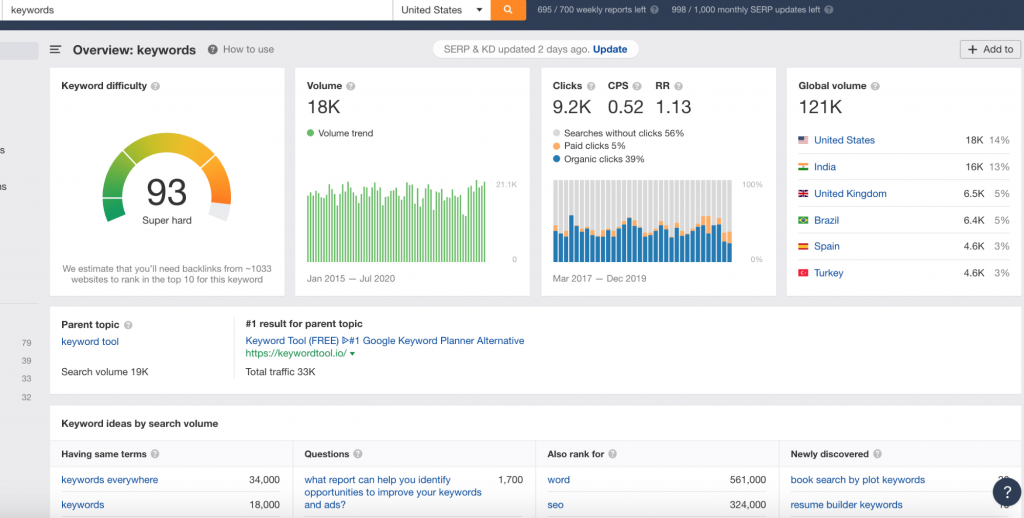
Ahref’s Keyword Difficulty score system is another winner, as we can actually see an exact quantity of backlinks needed to be able to rank on the first page for that keyword.
The only major downside is Ahrefs is not a free tool, but it’s worth your bucks particularly if you’ll have multiple or many people using it. You can also get access to tools like Ahrefs’ Backlink Explorer, which allows you to measure the domain authority of any website URL – a must for SEO.
4. SEMrush
Another stellar alternative. On SEMrush, it’s easy to check top seed keywords and their search volume that your competitors are already ranking for under their Competitive Research section. This is the standout feature that SEMrush’s keyword toolkit offers.
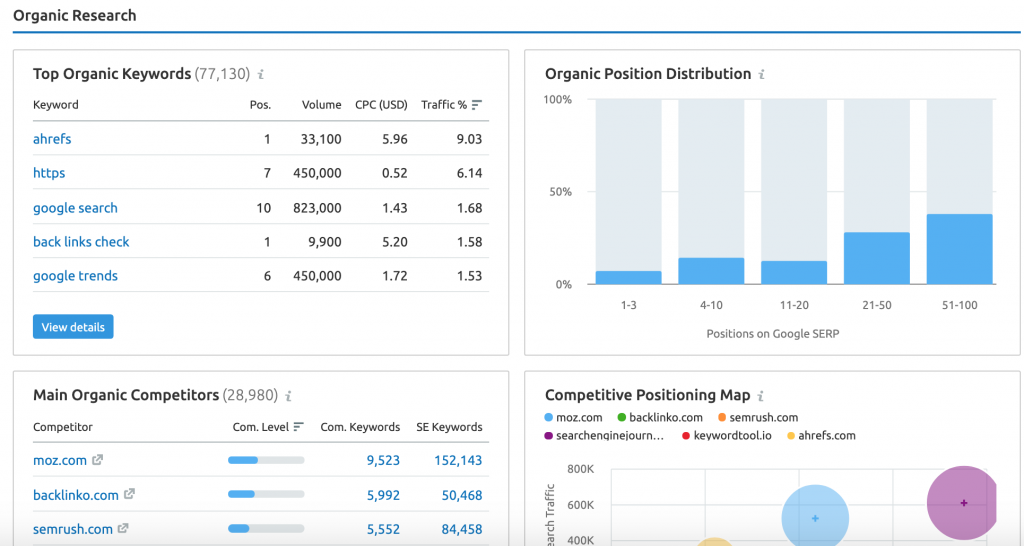
Alternatively, the Keyword Magic Tool is a great way to quickly conduct a keyword search to check search volume as well as all the other metrics you want to know about. You can also use this to find more keyword ideas, including phrase match keywords or keywords that are also questions.
Finally, there are a bunch of other features to help with other parts of your SEO strategy, such as your content audit or website trends analysis.
Best of all, these are all free tools that are available to anyone with a SEMrush account — just bear in mind you’re limited to 10 keyword searches per day on the free plan so you’ll need to prioritize keywords that you want to search for.
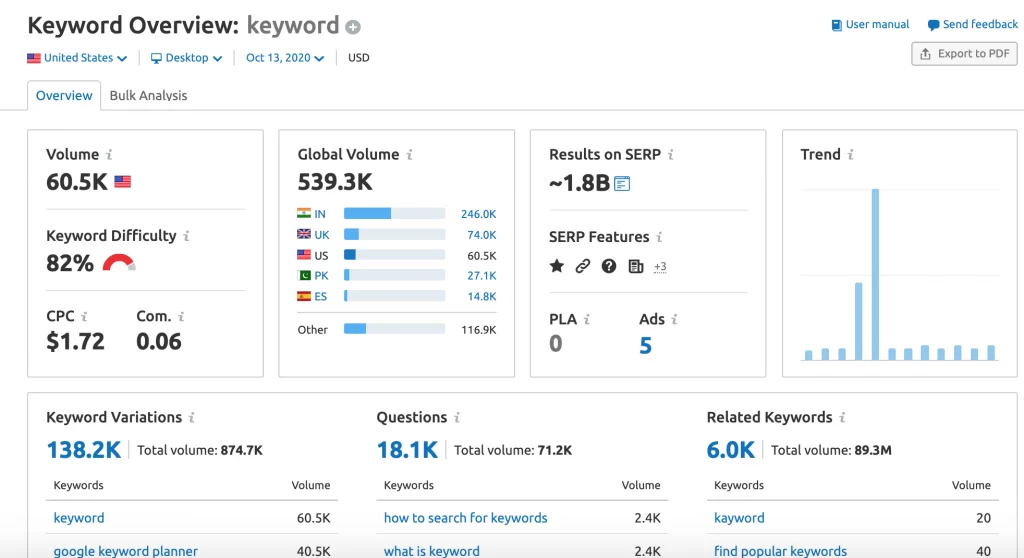
5. UberSuggest
Neil Patel’s free keyword research tool, UberSuggest, is particularly helpful for finding keywords and long tail variations of existing phrases in your keyword lists.
It’ll spit out key metrics such as monthly search volume, SEO competition, average CPC and PPC competition.
You can also sort by suggestions, related, questions, prepositions (having two related queries in one term) and comparisons (which splits out terms that include “versus”, “or” or “and” terms) which not all other competitor tools do. Not bad for a free keyword tool at all.
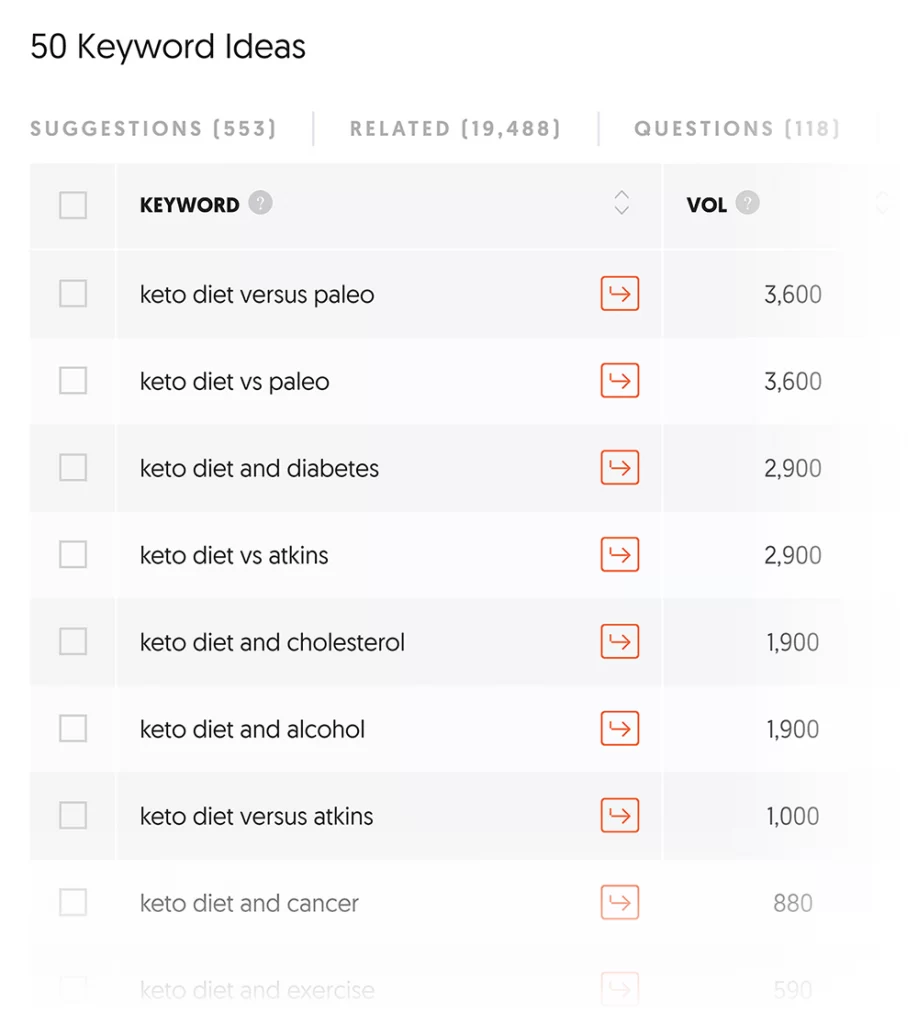
6. Google Search Console
Google Search Console is one of the most important digital marketing tools in your advanced keyword research. It sheds valuable insights that you can use to get the right keywords for the right sites.
To find this, hop on to the Search Analysis option like so:
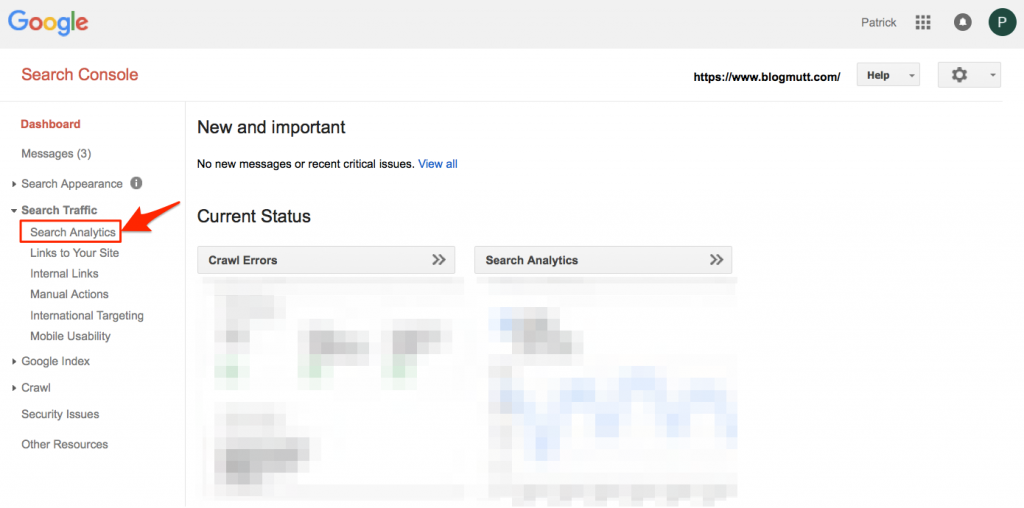
Here, you’ll see your top performing pages. If you click ‘Queries’ on one of those pages, you can see the terms that bring the most traffic:
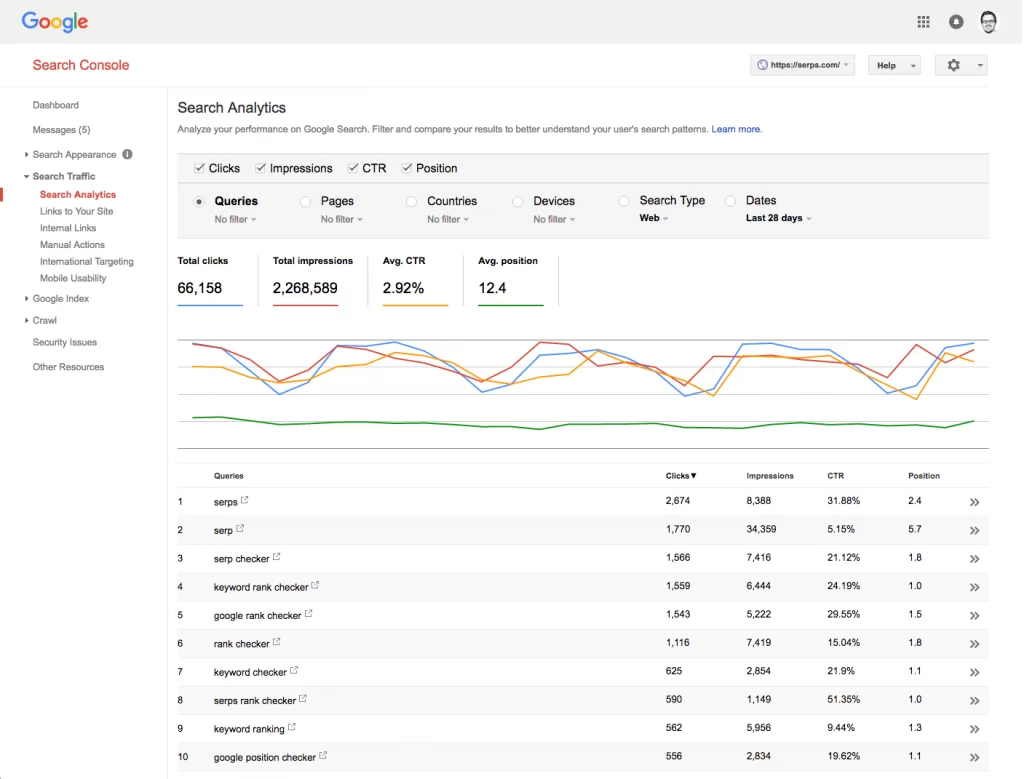
These are your star performers. Try to incorporate those keywords into the pages that have the most revenue potential. If they don’t fit into the content, you can use related keywords that will.
Once you do this, you’ll be able to create a group of high-performing keywords that make people land on the pages with the most revenue.
7. Google Trends
This is a great free Google tool to discover new keywords and search trends. On Google Trends, you can quickly see how much search interest there is for any particular query over time, interest by sub-region or city and whether a keyword is becoming increasingly popular.

What’s cool is that Google will show you related rising and top queries for the term too. Plus, you can also filter to specifically look at interest via News Search, Image Search, Google Shopping or YouTube Search.
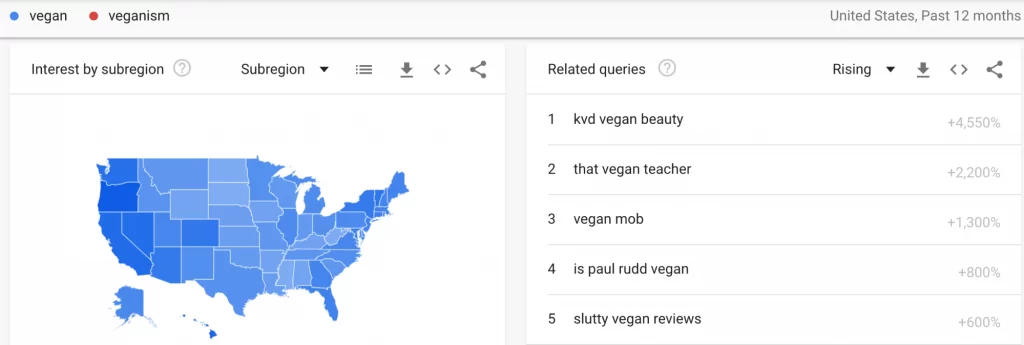
Being able to compare multiple terms at once also comes in handy to quickly get a good snapshot of general search interest.
Overall, Google Trends is particularly helpful if you’re creating evergreen content so you know these are topics people are actually interested in now and for the longer term.
Keyword research checklist
- Develop different buyer personas based on the problem your brand solves.
- Identify approximately content pillar topics related to your products or services.
- Find niche keywords for your pillar topics. These should be relevant to the products you offer, without being too generalised or overused.
- Pinpoint opportunities to rank for long-tail keywords using keyword research tools (more on that below).
- Use research goldmines like forums, Wikipedia, Google Trends, Reddit and Quora to get more long-tail keyword inspiration.
- Narrow down your list based on search intent, competition, and difficulty.
- Test your keywords using Google Ads. Find the highest-converting keywords and prioritize these.
- Use Google Search Console to track your progress and identify your best-performing keywords.
The takeaway
Ranking high on Google is by no means an easy task. The engine algorithm changes frequently, and it can prove challenging to adapt to all those changes.
But with the right formula and the best tools under your belt, you’re well on your way to improving your organic traffic and conversions. And that’s just the tip of the iceberg.
Turning all of these tools and strategies into rankings and search traffic that then turns into revenue? You’ll need an evidence-based campaign tailored to your goals. If you’re looking for an experienced SEO Agency to partner with, why not claim our FREE offer today — get an SEO Audit Call and strategy worth $2,000.


